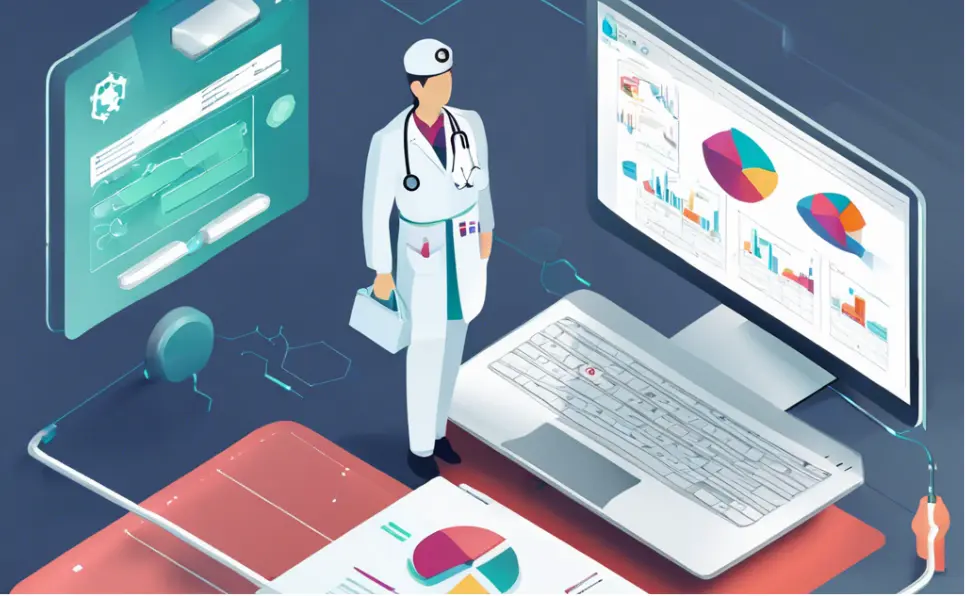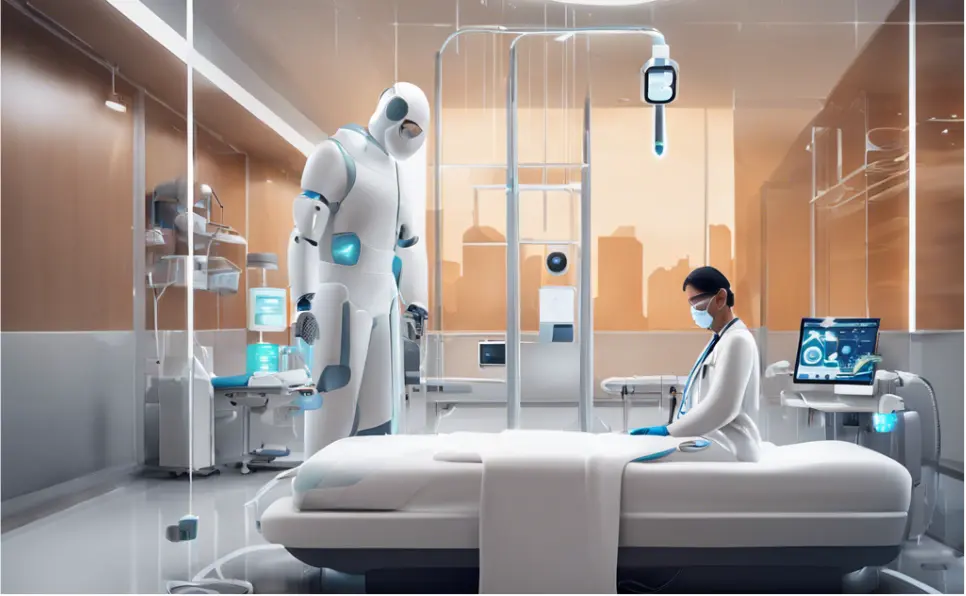Artificial Intelligence (AI) is rapidly changing how healthcare is delivered, bringing improvements we couldn’t have predicted even a few years ago. In this article, we’ll explore the different ways in how AI in healthcare is being used, its benefits and challenges, and what we might see in the future.
What is AI in Healthcare?
Simply put, AI in healthcare uses advanced technologies to help doctors and medical professionals do their jobs better. It’s about using computer systems that can learn and improve from data to support everything from diagnosing illnesses to managing patient records.
You might even interact with Artificial Intelligence in your everyday life through health apps or wearable devices that track your fitness.

Examples of AI in Action:
- Helping doctors detect diseases earlier through AI-driven diagnostics
- Using AI to guide robotic surgeries
- Personal health monitoring through apps that suggest lifestyle changes
How AI in Healthcare is Being Used
Artificial Intelligence is changing the game in healthcare. With conversational AI, patients can get quick answers and support whenever they need it. In marketing, it helps healthcare providers reach the right people with messages that resonate. Claim processing has become smoother and faster, making life easier for everyone involved.
The economic benefits are clear, too—AI helps cut costs and improve efficiency. Companies like Tempus and Zebra Medical Vision are leading the way, showcasing just how impactful AI can be. But we also need to think about the legal side, especially around data privacy and ethics, as this technology keeps moving forward.
Conversational Artificial Intelligence at Work
Have you ever asked a chatbot a question about your health or booked an appointment online? That’s conversational ai in healthcare at work. This technology helps patients connect with their healthcare providers more quickly and easily. Whether it’s answering a simple question or helping to schedule a doctor’s visit, conversational AI is making healthcare more accessible and responsive.
How Conversational AI Offers Patients:
- 24/7 answers to health-related questions
- Easy appointment scheduling or rescheduling
- Personalized advice and recommendations based on symptoms
Benefits of AI in Healthcare
Like any new technology, AI in healthcare comes with its pros and cons.
Pros:
- Improved accuracy: Analyze huge amounts of data quickly, helping doctors make more accurate diagnoses.
- Speed: Process information faster than humans, which can speed up treatment decisions.
- Efficiency: Automating routine tasks lets healthcare providers focus more on patient care.
Cons:
- Data privacy concerns: It needs a lot of patient data to function effectively, raising concerns about how that data is stored and used.
- Bias in algorithms: These systems are only as good as the data they’re trained on, which can sometimes lead to biased or inaccurate outcomes.
- Cost of adoption: Implementing AI technologies can be expensive, especially for smaller healthcare providers.

AI in Healthcare Case Study
Artificial Intelligence represents more than a futuristic concept, it’s already being used in hospitals and clinics around the world. Here are a few examples of how AI is improving healthcare today:
- Medical Imaging: Scan X-rays, CTs, and MRIs, helping radiologists spot problems like cancer or fractures quicker and more accurately.
- Drug Discovery: Helping researchers discover new drugs by analyzing massive amounts of data that would take humans years to cover.
- Surgical Assistance: Robotic surgery systems use technology to help surgeons perform complex procedures with greater precision, leading to faster recovery times for patients.
Marketing Services
AI isn’t just changing the medical side of healthcare; it’s also transforming how healthcare providers market their services. Hospitals and clinics are using Artificial Intelligence to understand their patients’ needs better and tailor their outreach efforts. AI in healthcare marketing allows providers to offer personalized healthcare options.
For example, AI can help identify which patients are most likely to benefit from a specific treatment.
- Predicts patient needs based on previous medical history
- Personalizes marketing campaigns to target specific health conditions
- Improves patient engagement and satisfaction with personalized follow-ups
Economic Impact of AI in Healthcare
AI is not only improving healthcare outcomes but also driving economic benefits. By automating routine tasks, Artificial Intelligence helps hospitals and clinics save money. Plus, the rise of AI in healthcare is creating new jobs, particularly in technology and data management fields. Over time, AI could also lead to more efficient healthcare systems, which could reduce costs for both providers and patients.
Economic Benefits of AI:
- Lower operational costs by automating administrative tasks
- Improved efficiency, reducing the strain on healthcare systems
- Growth in tech jobs related to AI and healthcare innovation
Challenges AI Faces in Healthcare
Despite its many benefits, AI in healthcare is not without its challenges. The healthcare industry needs to address several issues to ensure AI is safe, fair, and effective.
Major Challenges Include:
- Privacy concerns: AI systems need access to a lot of personal health data, making it essential to have strong data protection measures in place.
- Regulatory hurdles: Healthcare is a highly regulated industry, and AI systems need to comply with strict guidelines to be safely used in clinical settings.
- Bias in AI: Ensuring AI systems are trained on diverse, representative data is critical to avoid biased outcomes.

Future of AI Healthcare Startups
Many small, innovative AI startups are leading the way in transforming healthcare. These companies are developing cutting-edge solutions to some of the industry’s biggest challenges, from improving diagnostics to creating new ways to deliver care remotely.
Some Key Startups Include:
- Zebra Medical Vision: Focuses on AI-driven medical imaging to help radiologists detect diseases more accurately.
- PathAI: Uses AI to assist in diagnosing diseases from pathology slides.
- Babylon Health: Offers AI-powered telemedicine services that allow patients to consult with doctors remotely.
FAQs
What is AI’s role in healthcare?
Making easy treatments & helps doctors by analyzing medical data, assisting with diagnoses, and offering personalized treatment options.
What are the main benefits of AI in healthcare?
Enhances the accuracy of medical decisions, speeds up the diagnosis and treatment process, and makes healthcare more simple.
Are there any risks to using AI in healthcare?
Yes, risks include data privacy concerns, the potential for biased decisions, and the high cost of implementing AI technologies.
How does conversational AI benefit patients?
Conversational tools can answer patient questions smoothly, help schedule appointments, and provide health advice in real-time, making healthcare more convenient.
What are the biggest challenges for AI in healthcare?
Some biggest challenges include protecting sensitive patient data, ensuring fairness in AI algorithms, and complying with healthcare regulations.
Conclusion
AI is already making a huge impact on healthcare, from improving diagnostics to providing more personalized patient care. While there are challenges to overcome – like data privacy and algorithmic biases – the potential benefits of AI in healthcare are enormous. As technology continues to evolve, AI will undoubtedly play a critical role in shaping the future of medicine. Stay updated with the latest AI trends on DIA N SCO TOPICS.


